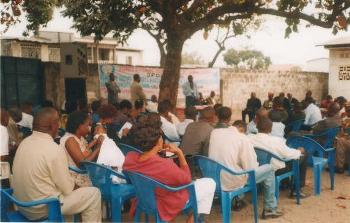|
|
News from JFDHOP (Democratic Republic of Congo)
un article par Medard du Rocher Bope
In recent months, the organization JFDHOP (Jeunes et Femmes pour les droits de l'homme et la paix) have realized a number of activities in relation to its environment both politically and socially. The following new actions of the Association respond to the new and complex situation in the DRC (Democratic Republic of the Congo) where the country has established democratically elected institutions at both national and provincial levels after a long period of armed conflicts which had plunged the country into a chaotic situation.
-- In May 2008, JFDHOP helped to mediate a conflict between the youth in Kingabwa (a district of the municipality of LIMETE) and those of MASINA. This conflict has claimed the lives of a number of people, as well as theft, injury and destruction of some houses. The actors in this conflict are passengers on the Aero-city train which goes through the Kingabwa district and who are victims of insults, slowing of the train, theft of property, and kidnapping of children and women. It has happened that small children have been thrown into the river that separates the two municipalities and women have been raped. This has led to a war of stones, bottles and other objects thrown from the urban train. The mediations brought together a number of Kingabwa sportsmen and some representatives of train passengers with the contribution of the National Police, and as a result the situation has become calm again.

click on image to enlarge
-- In June 2008, at an extraordinary Assembly convened to address the continuing insecurity and an upsurge of violence throughout the Republic and particularly in Kinshasa, it was decided to establish an International Center for Training in Human Rights and Peace (CIFDHOP).
-- Our association has a major programme of awareness for all segments of the population through seminars on the theme of "Human Rights and Non-violence". This awareness has helped to calm the overheated spirit of members of the MLC political party (Mouvement de Liberation du Congo) of Jean-Pierre BEMBA the challenger of Joseph KABILA in the presidential elections. In this regard, during July your Association has trained adults in the Bandalungwa communities which have sustained a record high rate of assassinations.
-- In July, your Association has awarded diplomas to the participants of Bandalungwa, Linguala and Masina in the presence of a representative of Mayor of the Municipality of Bandalungwa, the UNESCO representative from the Kinshasa field office, secretariat of the UNESCO National Commission, the Director of the United Nations Office of human rights, gender and children's rights. A wide range of themes were developed during the training sessions, from the culture of peace and non-violence to the International Criminal Court and new information and communication technology.
-- Another activity in the month of June was the development of educational box images (boîtes à image) for the fight against corruption, in cooperation with the IFES (International Foundation for Electoral Systems).
-- Finally, the major programme of awareness on human rights and non-violence continues. For the moment, your Association is working in the community of Matete, a municipality known for its violence. We are already invited to go to Brazzaville (capital of the Republic of Congo), to Lodja in the province of East Kasai, DRC), and elsewhere. However, we do not know how we can take on additional commitments because our resources have been exhausted by the actions of July and August, and therefore we are seeking further assistance.
|








|
DISCUSSION
Question(s) liée(s) à cet article:
Can you add to this analysis of the Democratic Republic of the Congo?,
* * * * *
Commentaire le plus récent:
Evolution of the Peace Process in the Democratic Republic of Congo
submitted to CPNN in French by Solidarité avec les Victimes et pour la Paix and translated into English by CPNN
For the original article in French, see RDC Solidarite.
From the recent past to today
After the armed hostilities in 1996 and the fall of Mobutu in May 17, 1997, there was a period of relative calm for fourteen months. A new rebellion began on August 2, 1998. Very early, negotiations started in Lusaka (Zambia) and arrived at the first agreements of ceasefire dated from July 10, 1999. It was to oversee respect of these agreements of Lusaka that the Security Council of the United Nations set up its resolution creating the Observation Mission of the United Nations (MONUC).
It was in October 2006 that the first free elections were organized.
To establish an account of the situation is difficult, but it is easier to say that at the present time the effects of armed conflict are still sad at various levels. There is extreme poverty in the civilian population. Until the present a responsible solution has not been found to assure access of children to education.
Good news today is that the country now has a Constitution, a President of the Republic, a Parliament and a Senate and provincial assemblies as well as provincial governments following the democratic elections organized in 2007. In general, the Democratic Republic of Congo is arriving slowly at peace and stability despite the constraints of reconstruction and restoration of a state of law.
Without pretending to be exhaustive, this report is a description of human rights violations on the civilian population in the city of Kinshasa. Acts of torture continue to take place. . ... continuation.

|
|









